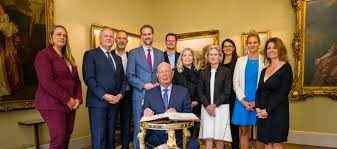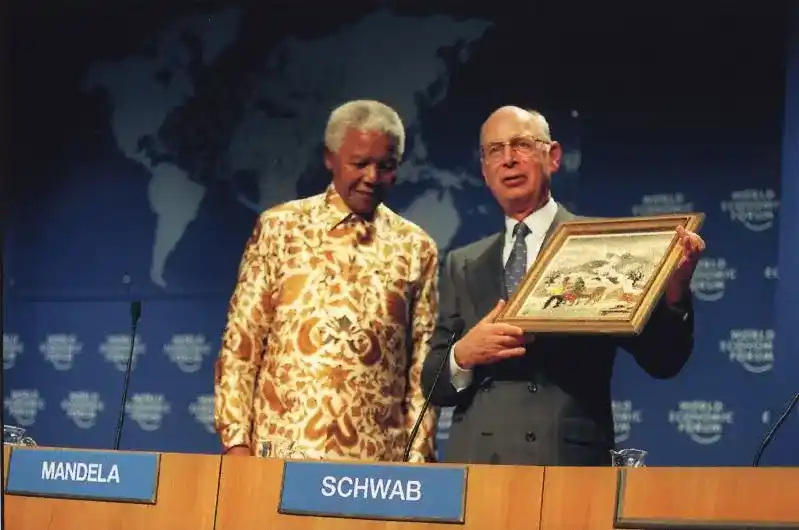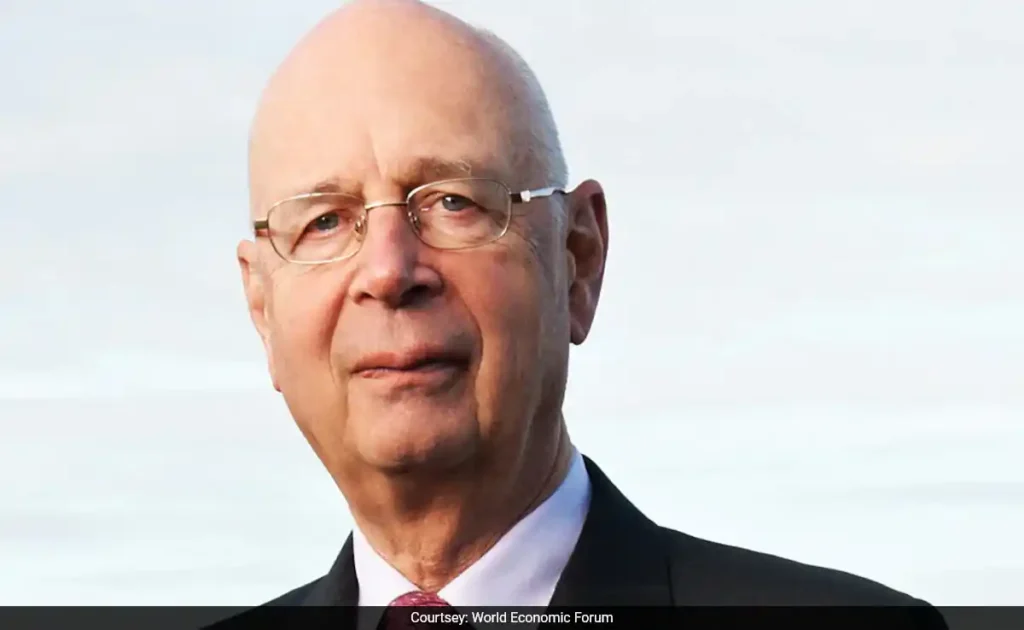Who is Klaus Schwab?
Klaus Schwab is a German engineer, economist, and global thought leader, best known as the founder and executive chairman (now honorary chairman) of the World Economic Forum (WEF). Established in 1971, the WEF became a pivotal platform for international cooperation, bringing together business leaders, political figures, academics, and innovators to discuss and shape global, regional, and industry agendas.
Born in 1938 in Ravensburg, Germany, Schwab’s vision was to create a space for inclusive dialogue at the intersection of the public and private sectors. Over the decades, he transformed the WEF into a unique institution influencing economics, policy, and innovation on a global scale.
👨👩👧👦 Personal Life and Family
Klaus Schwab married Hilde Stoll in 1971—the same year he founded the World Economic Forum. Hilde Schwab has been an active partner in many of his initiatives and is the co-founder of the Schwab Foundation for Social Entrepreneurship, an organization promoting innovative social enterprises worldwide.
Together, they have two children: Nicole Schwab and Olivier Schwab. Nicole is actively involved in environmental initiatives and gender equality, while Olivier has played roles within the WEF framework. The family resides in Cologny, Switzerland, a serene town near Geneva that also houses the WEF’s headquarters.

🧒 Early Life and Education
Klaus Martin Schwab was born on March 30, 1938, in Ravensburg, in the Free People’s State of Württemberg (then part of Nazi Germany). His father, Eugen Wilhelm Schwab, managed a factory that produced turbines, and his mother was Emma Gisela Schwab. The family background exposed Klaus to a blend of engineering, discipline, and organizational leadership from a young age.
His academic journey was both prestigious and international. Schwab earned a Doctorate in Engineering (Dr. Sc. Tech) from the Swiss Federal Institute of Technology (ETH Zürich), which laid the groundwork for his future pursuits in industry and policy. He then obtained a Doctorate in Economics and Social Sciences (Dr. rer. pol.) from the University of Fribourg in Switzerland.
To further enhance his understanding of public administration and leadership, Schwab studied at the John F. Kennedy School of Government at Harvard University, where he completed a Master of Public Administration (MPA). These diverse academic credentials allowed him to seamlessly operate across sectors and disciplines.
📊 Detailed Biography Table
| Field | Details |
|---|---|
| Full Name | Klaus Martin Schwab |
| Date of Birth | March 30, 1938 |
| Place of Birth | Ravensburg, Free People’s State of Württemberg, Nazi Germany |
| Nationality | German |
| Education | Dr. Sc. Tech from ETH Zürich; Dr. Rer. Pol from University of Fribourg; MPA from Harvard University |
| Occupation | Mechanical Engineer, Economist, Founder of the World Economic Forum |
| Years Active | 1971–2025 |
| Height | 1.73 meters (5 feet 8 inches) |
| Parents | Eugen Wilhelm Schwab (father), Emma Gisela Schwab (mother) |
| Spouse | Hilde Schwab (married in 1971) |
| Children | Two: Nicole Schwab and Olivier Schwab |
| Residence | Cologny, Switzerland |
| Net Worth (2025) | Estimated between $25 million and $225 million |
💼 Career
Founding of the World Economic Forum
Klaus Schwab’s career-defining moment came in 1971 when he launched the European Management Forum, which later became the World Economic Forum. His goal was to create a platform where European business leaders could learn American management practices. Over time, this expanded into a global conference covering diverse issues, including economics, sustainability, technology, and humanitarian challenges.
Schwab’s leadership transformed the WEF from a small, regional gathering into an internationally recognized non-governmental organization. The annual Davos Summit, held in Switzerland, became an iconic meeting point for elite leaders from around the world.
Author and Thought Leader
Beyond organizing events, Schwab has also shaped global discourse through his writings. His most notable works include:
-
“The Fourth Industrial Revolution” (2016) – Explores how technological advancements like AI, robotics, and IoT are transforming society.
-
“COVID-19: The Great Reset” (2020) – Co-authored during the pandemic, this book outlines how the global crisis could be a springboard for societal transformation.
These publications sparked both admiration and criticism, highlighting his influence and the ideological weight his perspectives carry.
Governance and Global Impact
Under Schwab’s stewardship, the WEF launched several global initiatives such as the Global Shapers Community, Young Global Leaders, and Centre for the Fourth Industrial Revolution. These initiatives aim to empower youth, shape future policy, and ensure technological development aligns with ethical and inclusive values.

📅 Klaus Schwab Career Table
| Year | Position/Role | Organization/Initiative | Description |
|---|---|---|---|
| 1960s | Mechanical Engineer | Various industrial roles in Europe | Worked in industry prior to academic and leadership roles. |
| 1971 | Founder & Executive Chairman | European Management Forum (later WEF) | Established the platform to bring together business and political leaders. |
| 1987 | Renamed Organization | World Economic Forum (WEF) | Transformed the European Management Forum into a globally recognized forum. |
| 1998 | Co-Founder | Schwab Foundation for Social Entrepreneurship | Founded with wife Hilde to support social innovators worldwide. |
| 2004 | Founder | Forum of Young Global Leaders | Created to foster leadership and cooperation among future global leaders. |
| 2011 | Founder | Global Shapers Community | Initiative to empower youth to shape local and global agendas. |
| 2016 | Author | The Fourth Industrial Revolution | Influential book on emerging technologies and societal transformation. |
| 2020 | Co-Author | COVID-19: The Great Reset | Called for a transformation in post-pandemic global systems. |
| 2021 | Executive Chairman | WEF | Continued to lead WEF through post-pandemic recovery discussions. |
| 2025 | Honorary Chairman & Resigned Board Chair | World Economic Forum | Stepped down from active leadership; Peter Brabeck-Letmathe became interim. |
🧾 Summary
Klaus Schwab’s life story is one of academic brilliance, visionary leadership, and global influence. From his early years in Germany to building one of the most powerful international institutions of our time, Schwab has played a pivotal role in shaping the dialogue around globalization, economics, and technological progress.
📱 Social Media Accounts
| Platform | Account Name | Link |
|---|---|---|
| X (formerly Twitter) | @ProfKlausSchwab | twitter.com/ProfKlausSchwab |
| @klaus___schwab | instagram.com/klaus___schwab |
📰 Latest News: Klaus Schwab Steps Down from WEF Leadership
As of April 21, 2025, Klaus Schwab, the 87-year-old founder of the World Economic Forum (WEF), has officially stepped down from his role as Chair and member of the Board of Trustees. Schwab, who established the WEF in 1971 to unite policymakers and business leaders in addressing global issues, transformed the annual Davos meeting into a prominent event symbolizing globalization. His resignation was accepted during an extraordinary board meeting on April 20, with Vice Chairman Peter Brabeck-Letmathe appointed as interim chair while a successor is sought. Reuters
Schwab’s departure marks the end of over five decades of leadership, during which he created a leading global platform for dialogue and progress. The WEF acknowledged his outstanding achievements and expressed gratitude for his relentless leadership. This transition comes amid evolving global dynamics and challenges, including criticisms of the forum’s internal culture and its relevance in addressing contemporary issues.
📏 Height and Physical Appearance
Klaus Schwab stands approximately 1.73 meters (5 feet 8 inches) tall. He maintains a distinguished and formal appearance, often seen in sharp suits and traditional business attire, especially during the Davos Summits. Even into his late 80s, Schwab presents himself with an authoritative demeanor, reflective of his long-standing influence on international policy and economics.
🌐 Internal Link: Nayib Bukele
Nayib Bukele, the current President of El Salvador, has garnered international attention for his unconventional leadership style and ambitious reforms. Since assuming office in 2019, Bukele has implemented aggressive measures to combat gang violence, including a controversial “state of exception” that has led to mass arrests and raised human rights concerns. His administration’s adoption of Bitcoin as legal tender marked a global first, aiming to revolutionize the nation’s economy despite facing criticism and economic challenges. Bukele’s political journey, from his early days as mayor to founding the Nuevas Ideas party, reflects his commitment to reshaping El Salvador’s political landscape. For a comprehensive overview of his life and policies, you can visit his detailed biography on Nexipedia.
🌐 External Link: Becky Lynch
Becky Lynch, born Rebecca Quin, is a renowned Irish-American professional wrestler known for her dynamic presence in WWE. Debuting in 2002, Lynch quickly rose through the ranks, earning titles such as the Raw and SmackDown Women’s Championships. Her persona, “The Man,” symbolizes her trailblazing role in women’s wrestling, breaking barriers and headlining major events like WrestleMania. Beyond the ring, Lynch has ventured into acting and continues to inspire fans worldwide with her resilience and charisma. To delve deeper into her career and achievements, explore her profile on Dataelle.
💰 Net Worth as of 2025
As of 2025, Klaus Schwab’s estimated net worth ranges from $25 million to $225 million, according to various sources. His wealth is primarily attributed to his leadership role at the World Economic Forum, his books, and advisory positions across numerous global institutions.
Unlike corporate CEOs, Schwab’s income has stemmed from leadership honorariums, board memberships, and publication royalties. He has also directed considerable funds toward philanthropic initiatives like the Schwab Foundation and social entrepreneurship programs. It’s worth noting that Schwab has often faced scrutiny for WEF’s financial opacity, which has sparked discussions about executive pay within non-profit global organizations.
FAQS
❓ What is the net worth of Klaus Schwab?
As of 2025, Klaus Schwab’s estimated net worth ranges between $25 million and $225 million. His wealth primarily stems from his decades-long leadership at the World Economic Forum, royalties from bestselling books, and involvement in various global initiatives and advisory roles.
❓ What is Klaus Schwab famous for?
Klaus Schwab is best known as the founder and former executive chairman of the World Economic Forum (WEF). He established the WEF in 1971 to create a platform where global leaders from business, politics, and civil society could collaborate on pressing global issues. He is also widely recognized for promoting ideas around the Fourth Industrial Revolution and stakeholder capitalism.
❓ What is the main goal of the WEF?
The main goal of the World Economic Forum (WEF) is to improve the state of the world by fostering dialogue and collaboration between public and private sector leaders. The WEF brings together policymakers, business executives, academics, and civil society leaders to address major global challenges like climate change, economic inequality, technological disruption, and public health.
❓ When did Klaus Schwab resign?
Klaus Schwab officially resigned in April 2025 from his role as Chair and member of the Board of Trustees of the World Economic Forum. After more than 50 years of leadership, he now holds an honorary chairman title, with Peter Brabeck-Letmathe named interim chair.
❓ What is the richest brokerage firm in the world?
As of 2025, Charles Schwab Corporation is considered one of the richest and most valuable brokerage firms globally, managing trillions in client assets. Other top contenders include Fidelity Investments, Goldman Sachs, and Morgan Stanley, all of which are leading players in global investment and financial services.

